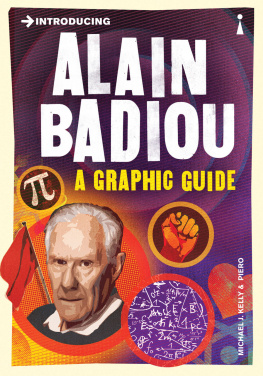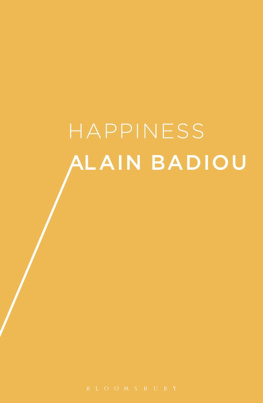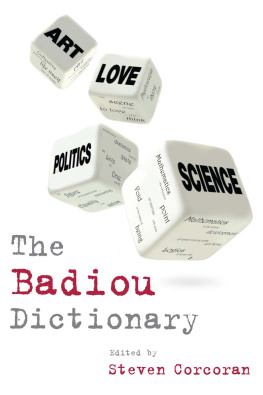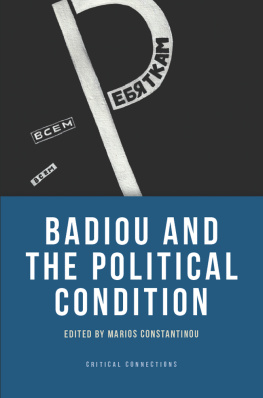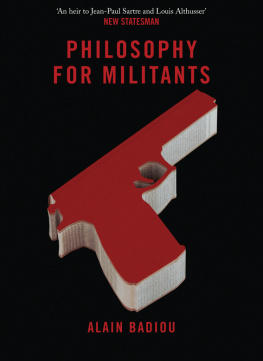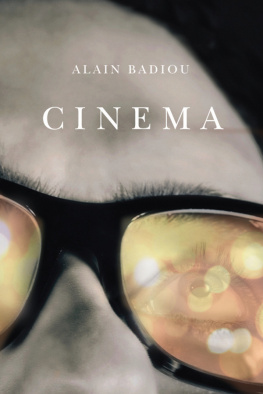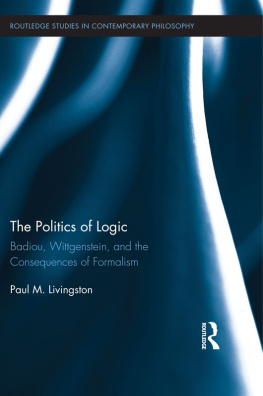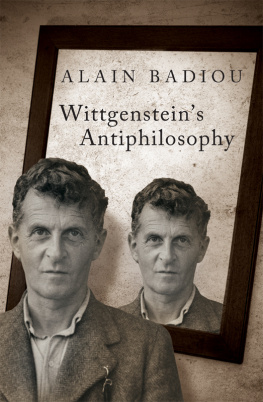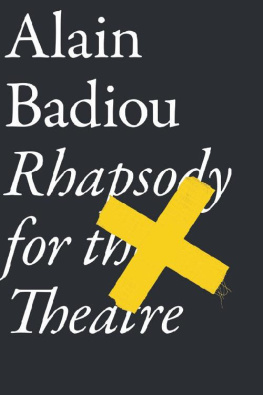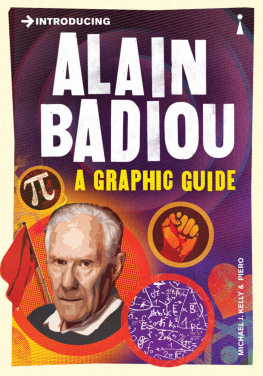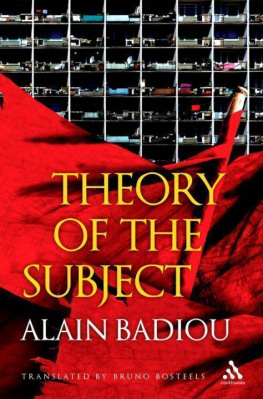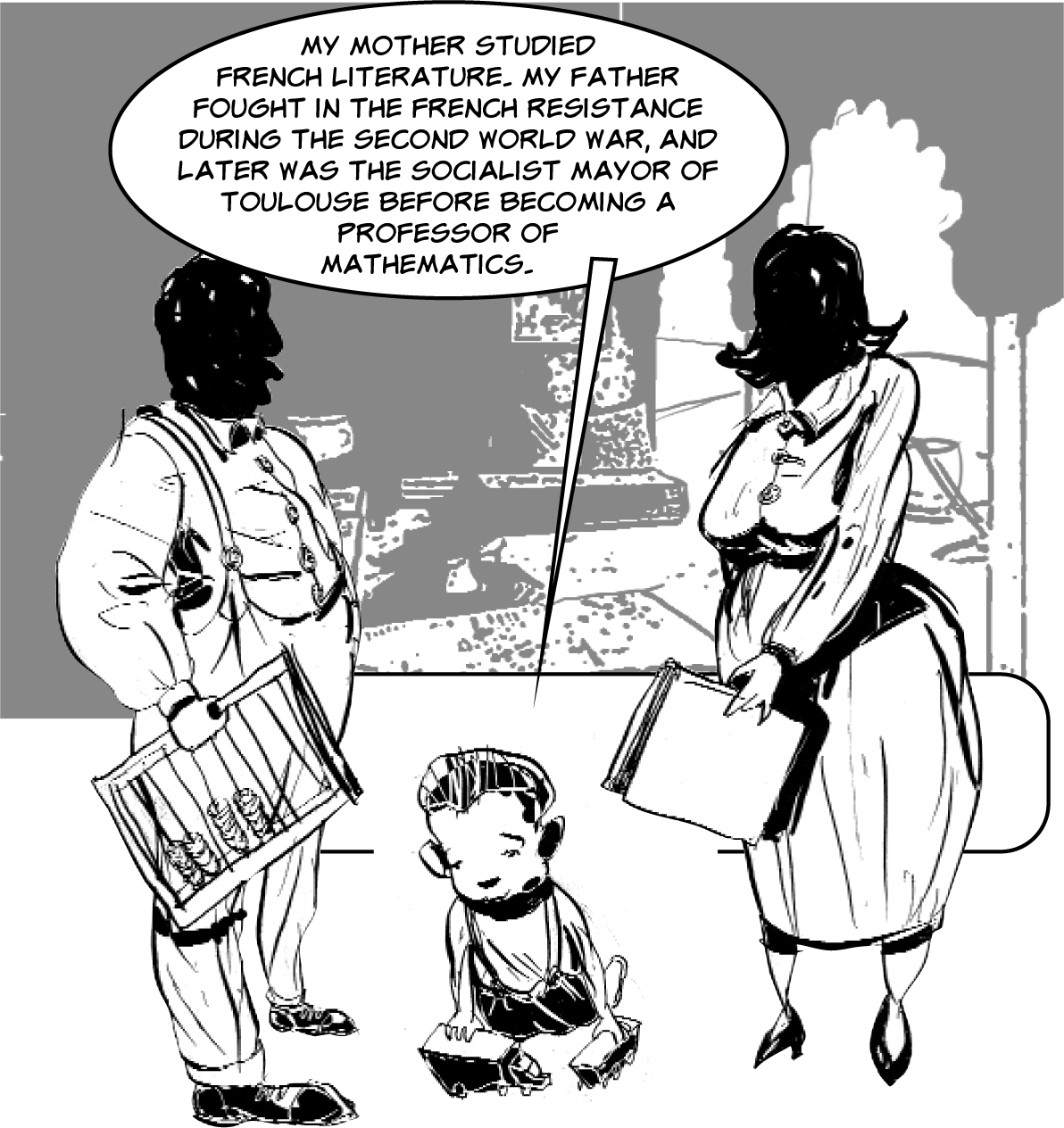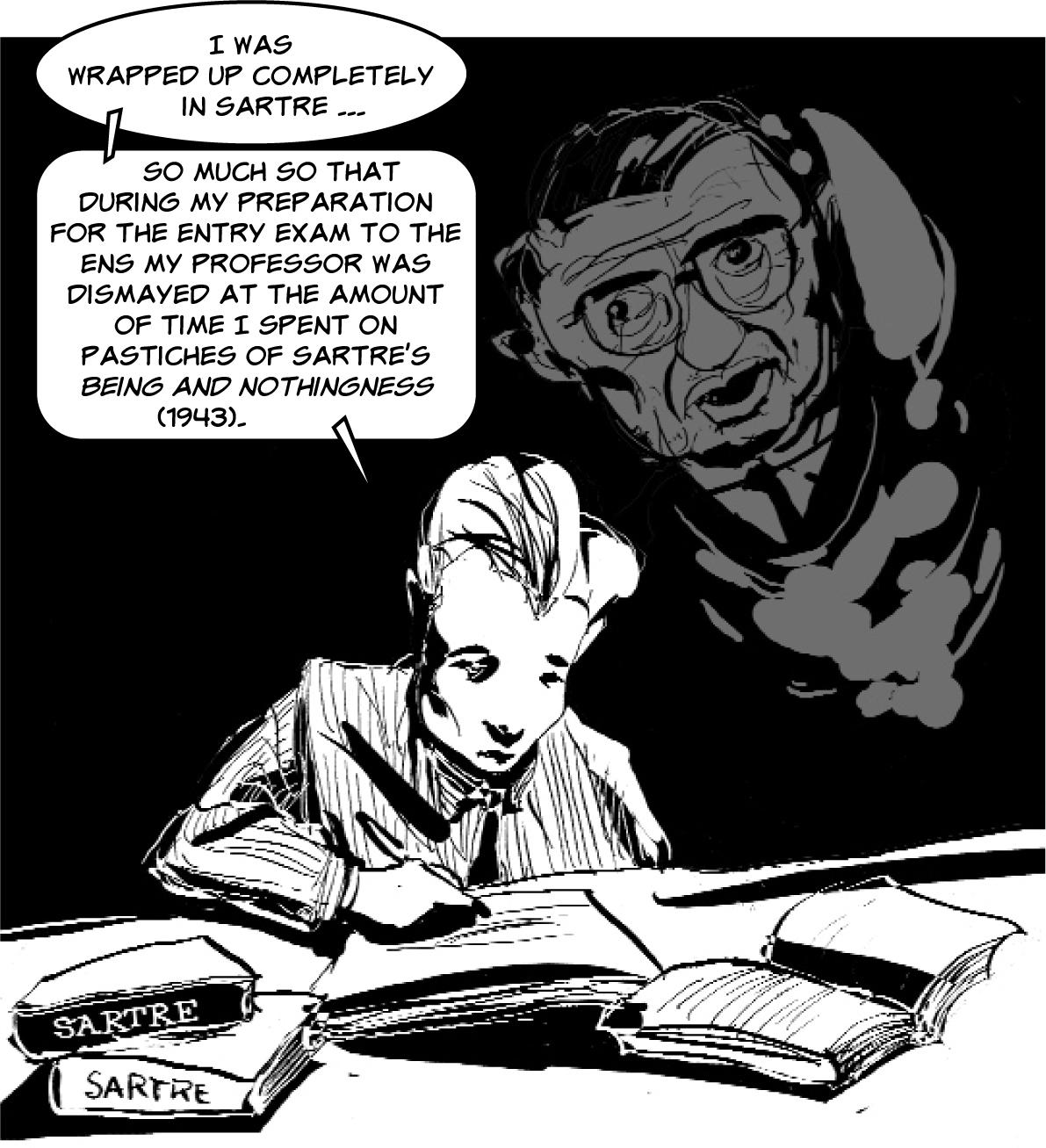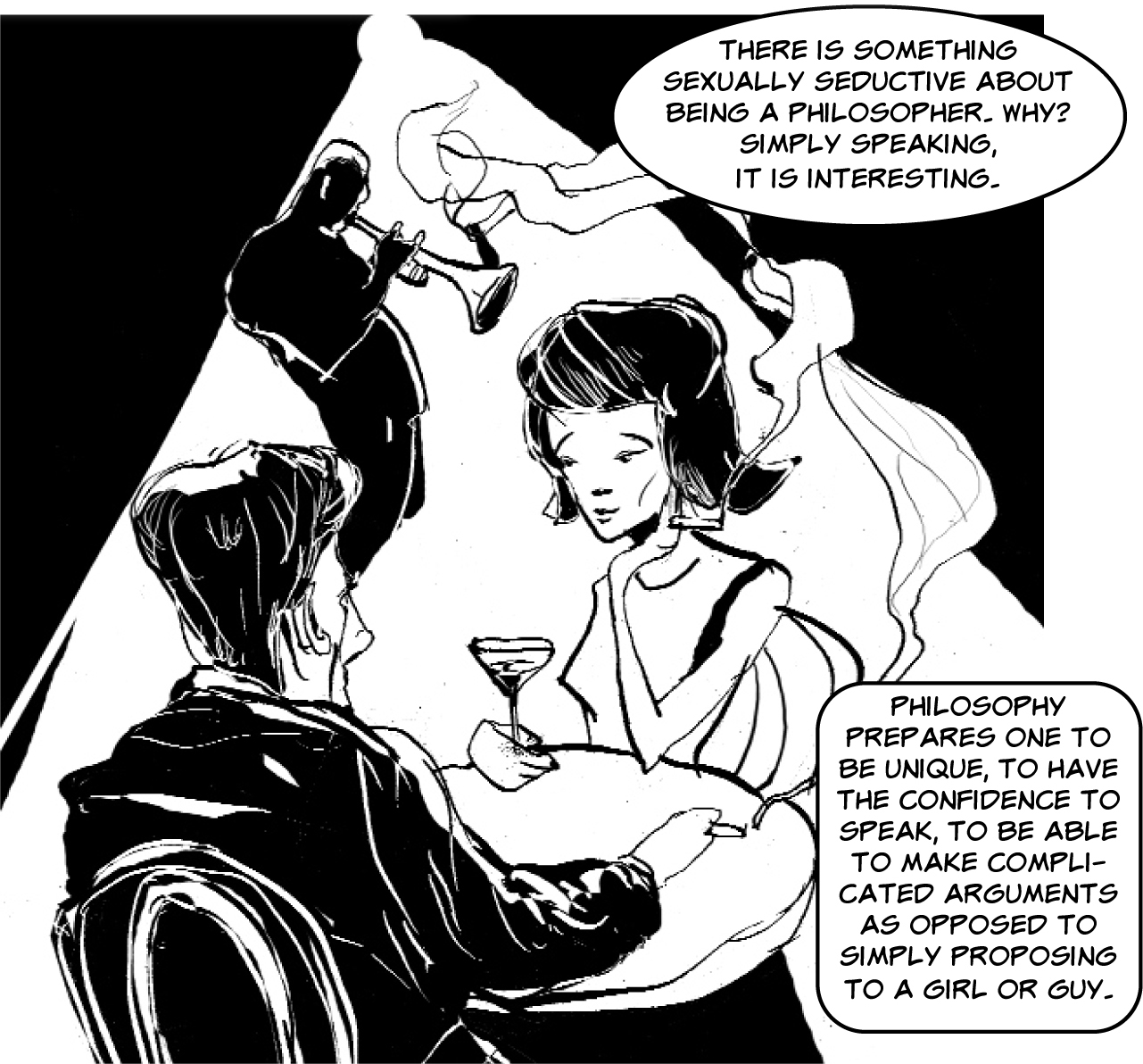Contents
Published by Icon Books Ltd, Omnibus Business Centre, 3941 North Road, London N7 9DP
Email:
www.introducingbooks.com
ISBN: 978-184831-665-2
Text copyright 2012 Icon Books Ltd
Illustrations copyright 2012 Icon Books Ltd
The author and illustrator has asserted their moral rights
Originating editor: Richard Appignanesi
No part of this book may be reproduced in any form, or by any means, without prior permission in writing from the publisher.
Introducing Alain Badiou
French philosopher Alain Badiou has now been publishing for 50 years. His works range from novels, poems, romanopras and popular political treatises to elaborate philosophical arguments engaging with mathematical theory.
Although the specific topics and characters differ between the texts, one can see throughout all of his writings, lectures and interviews an endless commitment to emancipatory politics and radical change through a fidelity to what he terms the event and its truth.
THIS FORMAL PHILOSOPHY OF EMANCIPATION IS FAITHFUL TO THE COMMUNIST TRUTH, THE UNIVERSAL IDEA OF COLLECTIVE LIFE.
Badiou is most recognized internationally for his collection of three books on subjectivity (theories about the ways, or forms, in which a body enters into a relationship with reality, and truths) and the role of the event and truth in ontology (theory of being, in and of itself): Theory of the Subject (Thorie du Sujet, 1982), Being and Event (Ltre et lvnement, 1988) and Logics of Worlds: Being and Event II (Ltre et lvnement Tome 2, Logiques des mondes, 2006).
It was with the translation of Being and Event in 2005 that Badious fame spread into the English-speaking world, though it can be argued that Theory of the Subject is the most important work of the three.
I AM FAMOUS, OR INFAMOUS, FOR MY RADICAL EMANCIPATORY POLITICS, INCLUDING MY STAUNCH DEFENCE OF THE COMMUNIST IDEA AS THE ETHICAL POSITION, FORMALLY SPEAKING.
Badiou in the world
In his short article Philosophy as Biography, as a pun on Nietzsches dictum that philosophy is always a biography of the philosopher, Badiou suggests that his philosophy is his autobiography. This is in many ways quite clear.
A self-defined provincial boy, Badiou was born on 17 January 1937 in Rabat, French-occupied Morocco, the son of a well-educated, upper-middle-class family. His mother attended the prestigious cole Normale Suprieure (ENS) in Paris.
MY MOTHER STUDIED FRENCH LITERATURE. MY FATHER FOUGHT IN THE FRENCH RESISTANCE DURING THE SECOND WORLD WAR, AND LATER WAS THE SOCIALIST MAYOR OF TOULOUSE BEFORE BECOMING A PROFESSOR OF MATHEMATICS.
Following his parents, Badiou graduated from the ENS. Unlike their work in literature and mathematics, though, Badiou studied philosophy.
PHILOSOPHY ALWAYS CONSTRUCTS ITS OWN SPACE AMID THE MATHEME A SYMBOLIC, OR FORMULAIC, REPRESENTATION OF AN IDEA MEANT TO PROVIDE IT WITH STABILITY AND THE POEM, BETWEEN THE MOTHER AND FATHER AFTER ALL.
Some philosophers have criticized Badiou for supposedly jolting back and forth between maths and literature too easily; but regardless, it doesnt take a psychoanalyst to see the familys intellectual trinity wrapped up in the figure of Badiou, the embodied mediation between his parents.
The family connection to the cole Normale Suprieure does not end for Badiou with his time as a student there. In 1999 he became chair of Philosophy at ENS, after 30 years teaching Philosophy at the University of Paris VIII (Vincennes-St Denis) and two years in Reims from 19667. Currently he is the Ren Descartes Chair at the European Graduate School, a small, private college on top of the Alps in the resort town of Saas-Fee, Switzerland.
The writing event
Badiou began his writing career in the early 1960s when he was affiliated with the epistemology circle (epistemology is the study of knowledge), a group of ENS students who published the journal Les cahiers pour lanalyse. It was in this journal that Badiou would publish some of his earliest philosophical texts. The first was called Infinitesimal Subversion in 1968, and a year later Mark and Lack: On Zero.
In 1964 Badiou published his first book, Almagestes.
THIS REFERS TO PTOLEMY AND HIS VIEWS ON ASTRONOMY, REFLECTING BADIOUS LIFELONG INTEREST IN THE THOUGHTS OF THE ANCIENT WORLD, ESPECIALLY THOSE OF ST PAUL.
His first book of philosophy is The Concept of Model (Le Concept de modle) published in 1969.
A Sartrean interrupted
Jean-Paul Sartre (190580) was essentially his total intellectual master during the whole of Badious early life as a philosopher, he tells us. The first theoretical text that sparked Badious interest in philosophy, and one relatively contemporary to him, was Sartres Sketch of a Theory of the Emotions (1939).
I WAS WRAPPED UP COMPLETELY IN SARTRE SO MUCH SO THAT DURING MY PREPARATION FOR THE ENTRY EXAM TO THE ENS MY PROFESSOR WAS DISMAYED AT THE AMOUNT OF TIME I SPENT ON PASTICHES OF SARTRES BEING AND NOTHINGNESS (1943).
With two committed Sartreans, Emmanuel Terry and Pierre Verstraeten, he also interrogated Sartres Critique of Dialectical Reason (1960).
The seductiveness of philosophy
Badiou turned away from Sartre, but he remained confident in his desire to become a philosopher. The deeper reason is likely that his family situation and education led him to it, but there is another more tangible one too, perhaps.
THERE IS SOMETHING SEXUALLY SEDUCTIVE ABOUT BEING A PHILOSOPHER. WHY? SIMPLY SPEAKING, IT IS INTERESTING. PHILOSOPHY PREPARES ONE TO BE UNIQUE, TO HAVE THE CONFIDENCE TO SPEAK, TO BE ABLE TO MAKE COMPLICATED ARGUMENTS AS OPPOSED TO SIMPLY PROPOSING TO A GIRL OR GUY.
What better reason can there be for becoming a philosopher, he jokingly asks. More seriously, he believes that the role of the philosopher is to challenge society simply because it is the way it is. To never give up. Finally, to always corrupt the youth!
Badious philosophy
Badious philosophy is a defence of

